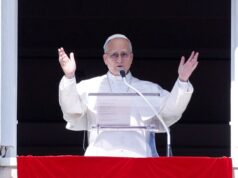Q: I’m one of the parents on a new “safety committee” for our local parish school. One of the parents’ main suggestions is that, for our school Masses, we lock the church doors and keep the Mass private. To us, this seems like basic common sense. However, our pastor says we can’t do that. Is there any way to explain his thinking?
A: My thought is that your pastor is probably aware of the requirement in canon law that churches be open to the public for liturgical celebrations, such as Mass. As Canon 1221 of the Code of Canon Law states: “Entry to a church at the hours of sacred functions is to be open and free of charge.”
So in light of this, closing the doors of a church to the faithful while Mass is being celebrated in that church is straightforwardly against the law.
Some canon lawyers believe that this law can be dispensed by the local bishop, who might in theory give special, limited permission to lock the doors of a church during Mass for an appropriately serious reason.
But other canon lawyers would argue that this requirement cannot be dispensed, not even by the local bishop, because it pertains to the heart of what a church building is most essentially.
Canon 1214 tells us that: “The term ‘church’ means a sacred building intended for divine worship, to which the faithful have right of access for the exercise, especially the public exercise, of divine worship.”
Or, in other words, a church building is a sacred space that is open to the public by its very nature. The faithful fundamentally have a right to join in the prayer conducted in a church building since it is, in a sense, their spiritual home.
Beyond this, it’s also possible that your parish priest might be taking certain pastoral concerns into account. For instance, if your pastor is the only priest assigned to your parish, it could be that the school Mass is the only scheduled daily Mass at your church. Your pastor might be reluctant to turn away the regular daily communicants, especially if there aren’t any nearby parishes with another daily Mass they could attend.
Additionally, many parish communities treasure the inter-generational witness to the faith that occurs when parents and other members of the parish are present and praying together with the students at a school Mass. Even when taking safety concerns into account, perhaps your pastor feels that the value of this lived example of Christian community is not something to set aside lightly.
That all being said, depending on your parish school’s specific needs and circumstances, there might be a few canonically permissible work-arounds.
If the parents feel that school Masses absolutely must be restricted to students and teachers only, one option is to have the school Masses celebrated somewhere other than the parish church building itself. For example, if the school community was fortunate enough to have its own separate oratory or chapel, it would be perfectly licit to celebrate a students-only Mass in that space, since canonically oratories and chapels are intended for the use of specific groups rather than the faithful at large (See Canons 1223 and 1226).
Alternatively, you could have the school Mass in the parish church building, potentially even with the doors locked, as long as there was an usher or guard stationed at the door to let in those who do not pose an obvious threat.
What is interesting to me about this latter arrangement is how it harkens back to the church’s ancient role of “porter.” Which, until the Second Vatican Council, was also one of the “minor orders” candidates for the priesthood would receive. In the early church, when Christians were still violably persecuted, porters were men who stood guard at the entrance to the place where Mass was being celebrated to protect the faithful from intruders who would seek to harm them.
Jenna Marie Cooper, who holds a licentiate in canon law, is a consecrated virgin and a canonist whose column appears weekly at OSV News. Send your questions to CatholicQA@osv.com.












